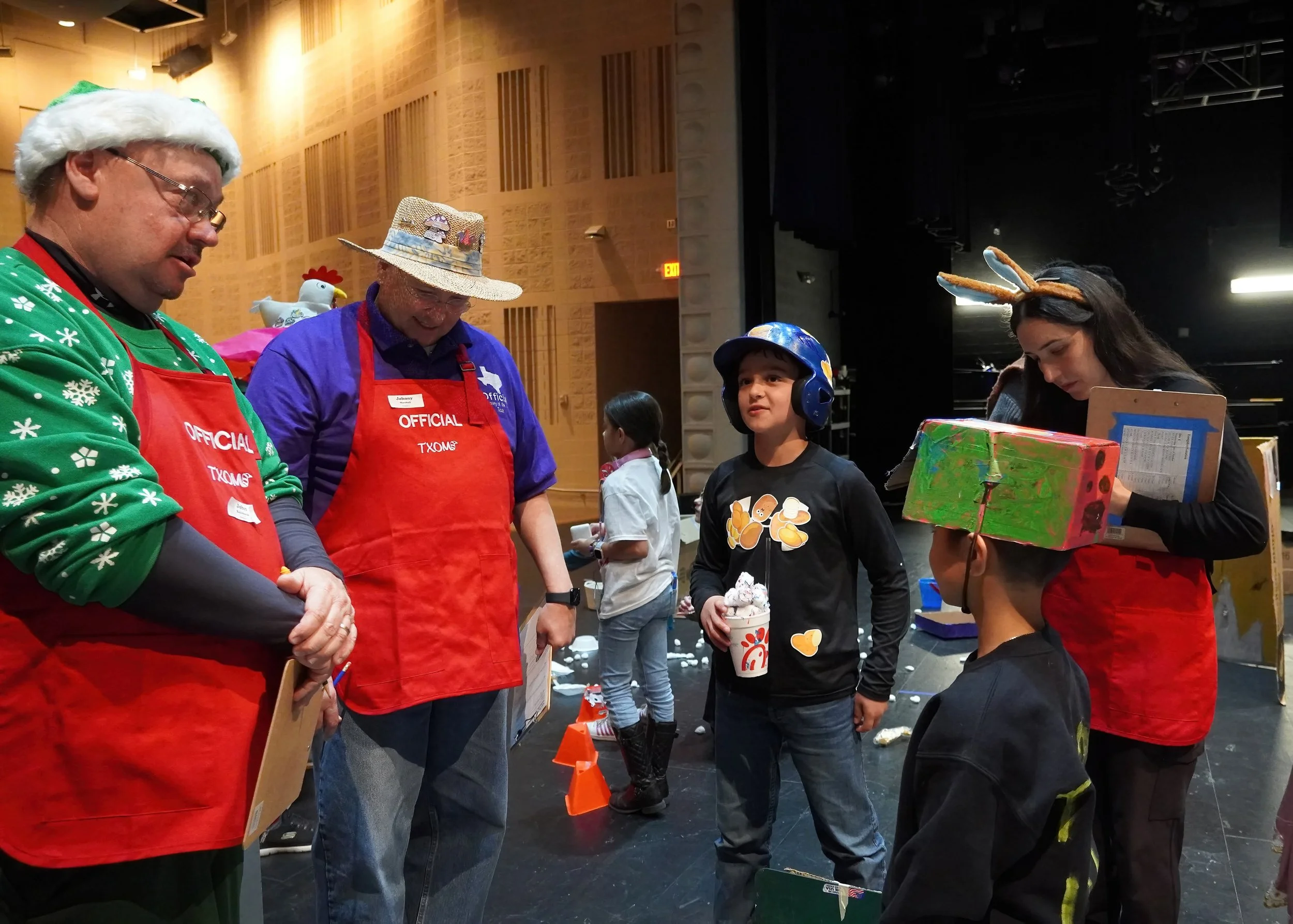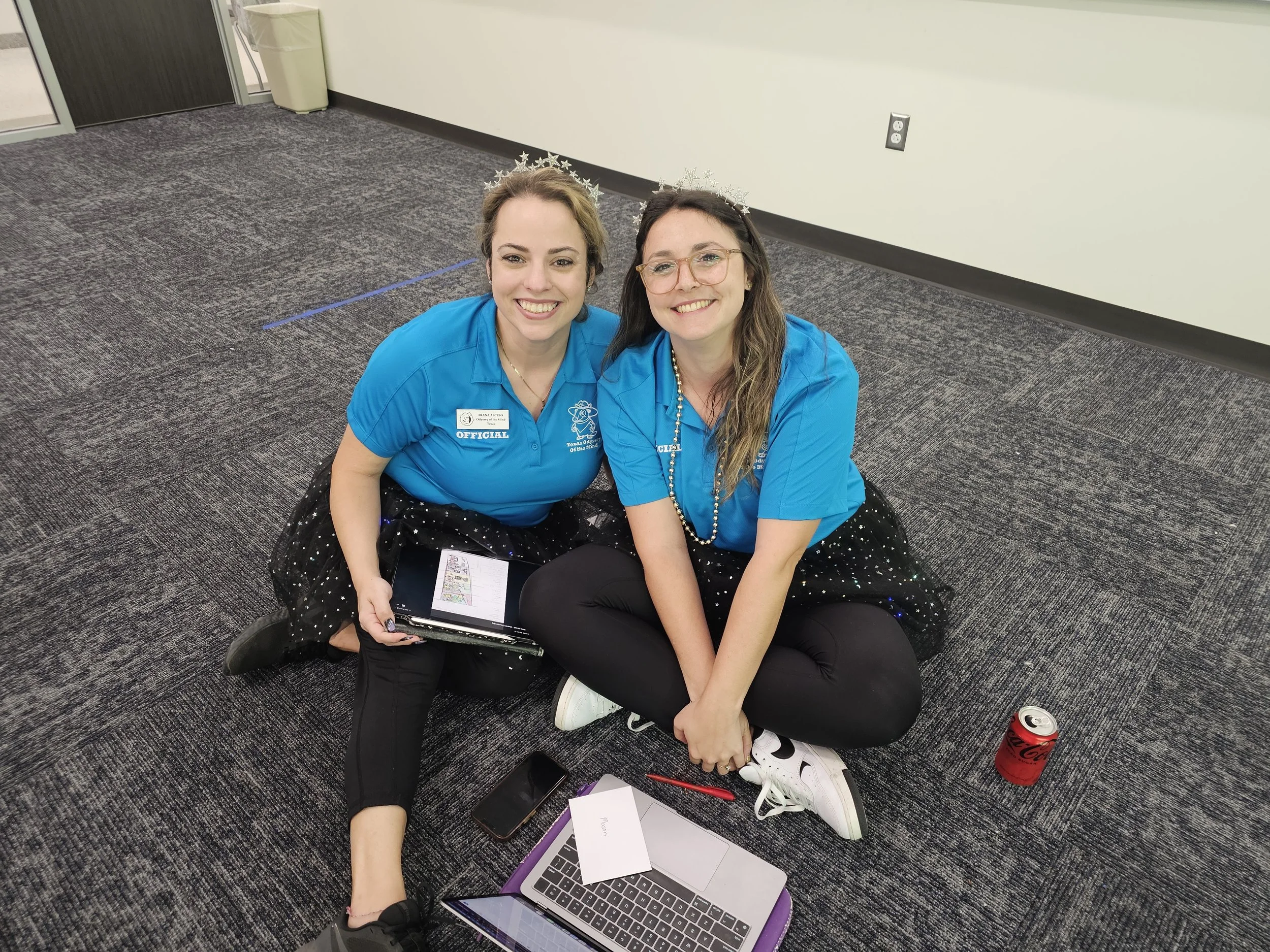Welcome to the Judge Information Page. If you are a returning judge, you may go straight to Judge Registration.
What is Odyssey of the Mind?
A program where teams of students work together to solve original, fun problems.
How?
By using their creativity
How do they present their solutions?
In an 8-minute performance.
What are the problems like?
There are a variety of Long Term Problems and there are Spontaneous Problems. Teams take weeks or months solving Long Term problems. Spontaneous problems are given to the teams at the tournament.
Judges wear "funny hats" in order to be less intimidating.
What is a Long Term Problem?
Long Term Problems have many components and range from emphasizing technology (Problems 1 & 2) to emphasizing the arts (Problems 3 & 5). Problem 4 is always a unique balsa structure that holds a lot of weight. View current year problem synopses here in order to make a selection of problem/group when you register.
Who are the Judges?
Judges are professionals, educators, artists, retirees, or military personnel from the Community. They are also volunteers from the team families who come for team credit. Team judges are not allowed to judge the same long-term problem as the team. Parents who have children on multiple teams cannot judge any problem that they have a child in.
Judging an Odyssey of the Mind problem is like being a member of the audience who can also give score. It is great fun to watch the amazing stories that kids create and to listen to them describing their progression.
What happens at Judge Training?
There are two parts to Judge Training. A) General Training. They learn about the program and the concept of creative problem-solving, and the judge types. Judges take the first part of training by watching a video or on-site.
B) At the problem/group-specific training, they break out in different teams and learn about a specific problem in order to become competition judges.
Check the calendar for location and dates of Judge Training in your Region. Specific Judge Training is required every year for all Judge positions, even for returning Judges. Judge training is only provided before Regionals. All judges must be trained and serve at Regionals, before they can particiapte at the State level.
Judge assignments
Most judges spend the competition day in the same room, judging multiple teams perform very different solutions to their problem. Sometimes, judges are assigned an alternate location for the afternoon. These assignments are made during judge training.
After Judge Training, Judges are given a specific position (role) so that they focus on one specific part of the presentation. This makes it easier to understanding and give a score on a small element. No one judge scores or ranks the entire solution. Each scoring judge is paired with 1-2 other judges for the same elements and their scores are averaged.
Our Problem 5 judges hard at work on tournament day
Judging Positions
(Interaction with teams)
Staging Area Judge
Greet & relax teams. Check paperwork. Give teams the chance to fix anything that is wrong or missing.
Timekeeper/ Announcer
Introduce yourself to the teams. Take paperwork to the judges and announce the team to the audience. Keep track of the performance time. The Timekeeper is encouraged to be theatrical (hat, costume, etc.).
Problem & Style Judges
Know what to score. Congratulate the team after its performance.
Scorechecker
Must have own laptop for data entry. Make sure the scores are in range and are compiled correctly.
Head Judge
Manage the judging team. Meet with the coach and give the raw scores.
Education and Professional Credits
Educators who identify themselves during Judge registration can obtain a G/T "Differentiated Curriculum" certificate recognized for 6 hours GT credit by most districts. If in doubt, contact your district’s Advanced Academics department to confirm. The certificate is delivered by hand at the competition or by follow-up email.
Professionals and military personnel can ask for a Community Service certificate.
What happens at competition
Judges gather under the direction of their Problem Captain ("PC") and review several teams in one division, following a specific schedule. Judges remain all day in one specific area that they were trained for (Specific problem, Spontaneous, Scoring, etc.). Judges cannot take a break to go watch their team perform.
After Judges Training, Judges volunteer at the Regional tournament first. If the team they represent advances to the TX State tournament, then judges are asked to also volunteer at the TX State Tournament.
In the Region that will be hosting the State tournament, ALL judges are required to participate in the TX State tournament as well.
Judges cannot be “job-share” volunteers. We need judges who have experience in the current problems for the second level. Therefore only trained and experienced judges from Regionals are accepted at the State level.
Travel
Meals are provided for Judges and Officials. Please read competition information provided about your local competition.
Reimbursement: Effective 2026, Judges are no longer reimbursed for travel, only for hotel, if they travel over 150 Mi one-way.
Hotel Accommodation is arranged and/or reimbursed for team judges and Officials traveling to the State tournament from out of region, based on double occupancy. Details are updated every year on the Judge Travel page closer to the time.
Texas Judges do not normally travel to World Finals. A special contingent represents the TX team at World Finals. Returning Judges who are interested to experience World Finals should contact their Problem Captain or the Regional Director in January.
If you have any questions or need more information, contact the Judge coordinator or Regional Director for your region. "HARO" stands for Houston Area Region Odyssey.
If you do not know what region you belong to, please email statejudge@txodyssey.org


